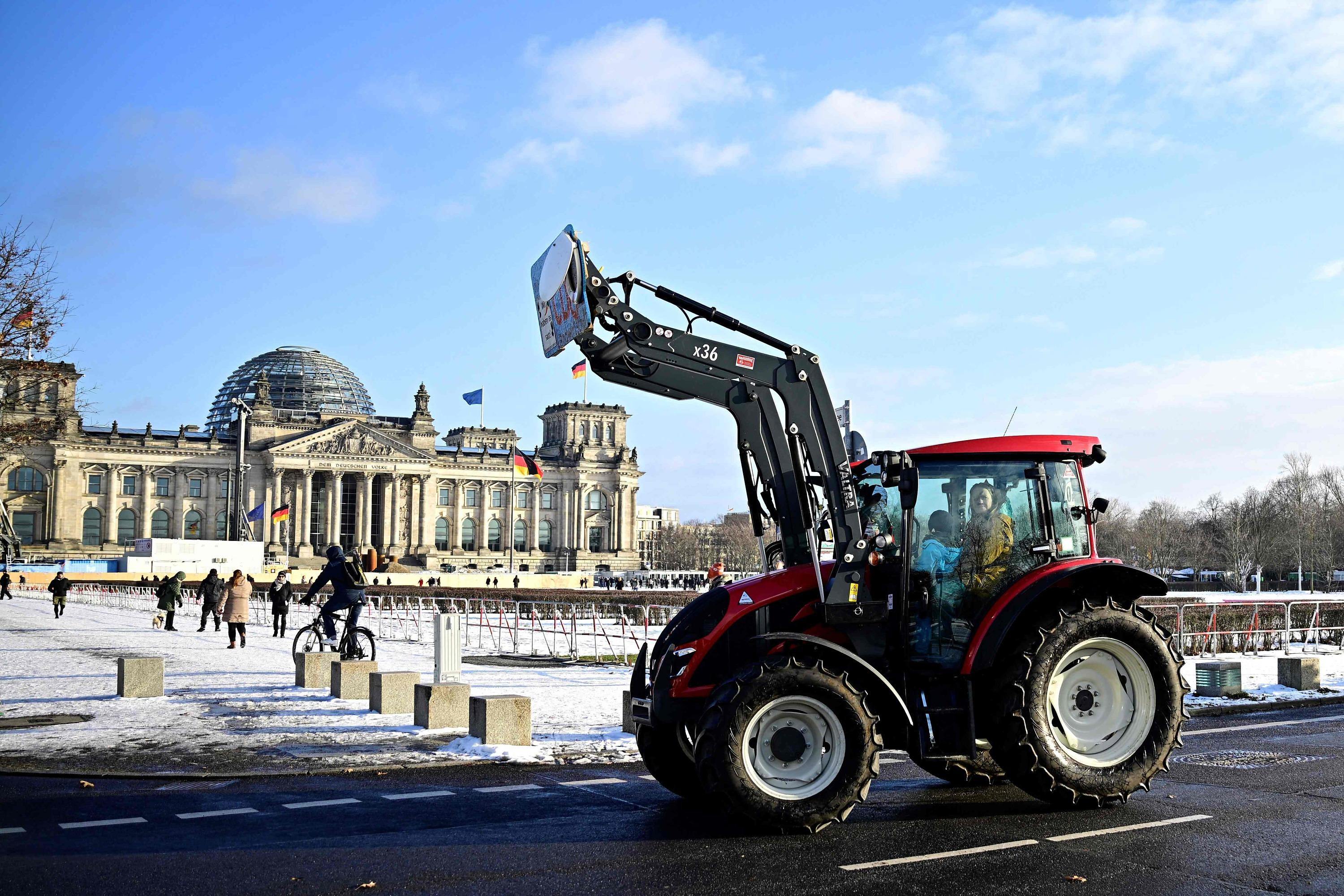French farmers continue their protest movement. And the phenomenon is gradually taking on a national scale. While several highways are still blocked in the four corners of the country, producers are threatening to block Paris with their tractors if the government does not quickly take action to calm their anger. Like France, farmers in many European countries are also expressing their discontent. In the Netherlands, Germany, Romania and even Poland, they preceded France.
This anger varies depending on the country but mainly concerns taxes on diesel, the reduction in the use of pesticides or the limitation of nitrogen or greenhouse gas emissions... Christiane Lambert, president of the Committee of Professional Organizations agricultural sector of the European Union, speaks of a global “exasperation” of European farmers, to the AFP. They have the feeling of “being imposed” measures that are too drastic, particularly in the context of the ecological transition, assures the former president of the FNSEA, the first French agricultural union. As agricultural ire grows throughout Europe, Le Figaro takes stock of the different reasons that push farmers of various nationalities to brandish their pitchforks in the streets.
Dutch farmers were the first to express their anger. From the fall of 2019, following the radical proposal by a center-left MP to halve livestock farming. This protest has not stopped since. It even worsened in June 2022, after the announcement by the Minister of “Nature and Nitrogen” to drastically reduce – by 70% – nitrogen emissions, recalled Christophe de Voogd, affiliated professor. in Sciences and author of History of the Netherlands. From origins to the present day (Fayard, 2003), in our columns. This decision by the Dutch state also follows the decision of the Supreme Court of the Netherlands of December 20, 2019 ordering the government to reduce its greenhouse gas emissions by at least 25% by 2020.
For several months, the Dutch have been blocking highways with their tractors and protesting in front of the homes of political leaders. Upside-down Dutch flags have become the symbol of their revolt. And this discontent is also reflected at the polls. A young party bringing together farmers, the “Farmer-Citizen Movement” (BBB), made a strong entry into the Senate in March 2023. It ultimately won fewer votes than expected in the November general elections.
Since mid-January, German operators have been demonstrating and threatening to expand the movement. They oppose the plan of Olaf Scholz's government to remove a tax advantage on agricultural diesel. A measure described as “harmful to the climate” by the government. But in reality, the latter seeks to “reduce its expenses” to complete its budget, contextualizes Alessandra Kirsch, director of studies at the Agriculture Stratégies think tank. Germany must indeed save several billions in budgetary expenditure to comply with a call to order from constitutional judges.
On January 15, nearly 5,000 tractors blocked the streets of Berlin and sounded their horns, police reported to AFP. The proposal to stagger the reform until 2026 was not enough to calm the anger of German farmers. Nor even the promise to “simplify” the profession by “reducing bureaucracy”. Because, as in France and everywhere in Europe, operators are faced with “administrative overload”, explains Alessandra Kirsch. “Every year, they must complete a declaration, but it is not already pre-filled like tax returns. It takes them days and causes them stress because the demands are very high. And they are not paid more for all that,” continues the specialist.
Also read Death of a farmer in Ariège: the three occupants of the car were under OQTF
In Romania, Poland and other countries bordering Ukraine, such as Slovakia, Hungary and Bulgaria, producers essentially denounce “unfair competition”. They accuse Ukraine of undercutting the price of cereals. “Since the Russian invasion, Ukrainian wheat no longer transits through the Black Sea and now goes by land,” analyzes Alessandra Kirsch. Ukrainian wheat, very competitive in terms of prices, is therefore invading the silos of neighboring countries. Which forces Polish and Romanian farmers... to lower their prices.”
In Poland, for example, protests forced the Minister of Agriculture to resign in April 2023. Polish operators began blocking crossing points with Ukraine last November. The blockade was finally suspended on January 6 after an agreement with the government, which provided for subsidies. In Romania, farmers have been demonstrating since the beginning of January and do not intend to let up their pressure on the government.
This European movement of agricultural protests is contagious. According to Christiane Lambert, president of the Committee of Professional Agricultural Organizations of the European Union, “the Italian and Spanish agricultural unions are also talking about demonstrations”. Their reasons? The extreme climatic events of recent years, particularly drought. “Certain areas of these countries may no longer be arable,” warns Alessandra Kirsch. Thus, “the problem now lies in water management, while agriculture in these countries relies mainly on irrigation. Particularly for market gardening,” specifies the specialist. However, it is “difficult” to imagine a “new model, as water-efficient as possible,” she adds.
“European farmers are generally fed up with the heavy constraints they face on a daily basis, without any increase,” explains Alessandra Kirsch. Beyond the administrative overload, producers denounce the reduction in the CAP budget which “has been cut by 90 billion euros in 20 years”, recalls the expert. “The authorization of imports of products treated with pesticides banned in Europe, or which do not respect animal welfare, such as the crowding of animals, also provokes incomprehension and anger among farmers,” he adds. -She.
In France, “there was no trigger for demonstrations like in the Netherlands or Germany for example”, but “it is an accumulation of constraints which push producers to the limit”, believes Alessandra Kirsch.
Also read Death of a farmer in Ariège: who was Alexandra Sonac, mowed down on a dam?
The environmental policies carried out by the European Union are also a factor which has fueled the ire of operators for several years. The Green Deal, presented in 2019, therefore before Covid-19 and the war in Ukraine, provides for a “reduction in the impact of agriculture on the environment and aims to decarbonize the sector”, recalls the specialist in agricultural economy. But these measures which seek, among other things, to reduce the use of pesticides or the increase in fallow land, “inevitably lead to a drop in agricultural productivity”. This is why farmers are contesting them and “asking to no longer be the only ones impacted by these policies,” highlights Alessandra Kirsch.

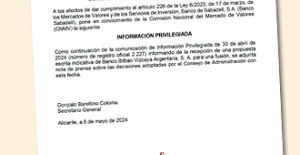 Sabadell rejects the merger with BBVA and will fight to remain alone
Sabadell rejects the merger with BBVA and will fight to remain alone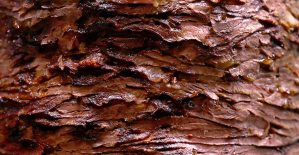 In Germany, the far left wants to cap the price of “doner kebabs”
In Germany, the far left wants to cap the price of “doner kebabs” Israel-Hamas war: Gaza between hope of truce and fear of Israeli offensive in the South
Israel-Hamas war: Gaza between hope of truce and fear of Israeli offensive in the South “Mom, Dad, please don’t die”: in the United States, a nine-year-old child saves the lives of his parents injured in a tornado
“Mom, Dad, please don’t die”: in the United States, a nine-year-old child saves the lives of his parents injured in a tornado The presence of blood in the urine, a warning sign of bladder cancer
The presence of blood in the urine, a warning sign of bladder cancer A baby whose mother smoked during pregnancy will age more quickly
A baby whose mother smoked during pregnancy will age more quickly The euro zone economy grows in April at its best pace in almost a year but inflationary pressure increases
The euro zone economy grows in April at its best pace in almost a year but inflationary pressure increases Children born thanks to PMA do not have more cancers than others
Children born thanks to PMA do not have more cancers than others “House of the Dragon”, “Succession”… Max, the new streaming platform from HBO and Discovery, launched in France on June 11
“House of the Dragon”, “Succession”… Max, the new streaming platform from HBO and Discovery, launched in France on June 11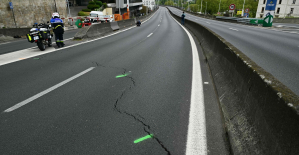 The A13 motorway will finally reopen this Friday, in one direction only
The A13 motorway will finally reopen this Friday, in one direction only TNT commission of inquiry: tensions between LFI deputies and Macronists before the vote on the report
TNT commission of inquiry: tensions between LFI deputies and Macronists before the vote on the report Apple unveils a new, more efficient iPad range
Apple unveils a new, more efficient iPad range The Gaza War invites itself to the 2024 Pulitzer Prizes
The Gaza War invites itself to the 2024 Pulitzer Prizes Judith Godrèche presents a short film on sexual violence in Cannes
Judith Godrèche presents a short film on sexual violence in Cannes Kevin Spacey: new trial in sight in London for the American actor, for sexual assault
Kevin Spacey: new trial in sight in London for the American actor, for sexual assault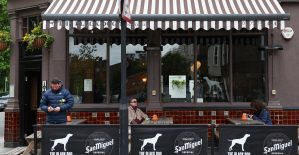 Taylor Swift fans make London pub Black Dog their new place of pilgrimage
Taylor Swift fans make London pub Black Dog their new place of pilgrimage Omoda 7, another Chinese car that could be manufactured in Spain
Omoda 7, another Chinese car that could be manufactured in Spain BYD chooses CA Auto Bank as financial partner in Spain
BYD chooses CA Auto Bank as financial partner in Spain Tesla and Baidu sign key agreement to boost development of autonomous driving
Tesla and Baidu sign key agreement to boost development of autonomous driving Skoda Kodiaq 2024: a 'beast' plug-in hybrid SUV
Skoda Kodiaq 2024: a 'beast' plug-in hybrid SUV The home mortgage firm rises 3.8% in February and the average interest moderates to 3.33%
The home mortgage firm rises 3.8% in February and the average interest moderates to 3.33% This is how housing prices have changed in Spain in the last decade
This is how housing prices have changed in Spain in the last decade The home mortgage firm drops 10% in January and interest soars to 3.46%
The home mortgage firm drops 10% in January and interest soars to 3.46% The jewel of the Rocío de Nagüeles urbanization: a dream villa in Marbella
The jewel of the Rocío de Nagüeles urbanization: a dream villa in Marbella Institutions: senators want to restore the accumulation of mandates and put an end to the automatic presence of ex-presidents on the Constitutional Council
Institutions: senators want to restore the accumulation of mandates and put an end to the automatic presence of ex-presidents on the Constitutional Council Europeans: David Lisnard expresses his “essential and vital” support for François-Xavier Bellamy
Europeans: David Lisnard expresses his “essential and vital” support for François-Xavier Bellamy Facing Jordan Bardella, the popularity match turns to Gabriel Attal’s advantage
Facing Jordan Bardella, the popularity match turns to Gabriel Attal’s advantage Europeans: a senior official on the National Rally list
Europeans: a senior official on the National Rally list These French cities that will boycott the World Cup in Qatar
These French cities that will boycott the World Cup in Qatar “The future is for us”: “disappointed” and “proud” at the same time, Al-Khelaïfi sees the glass half full after the elimination of PSG
“The future is for us”: “disappointed” and “proud” at the same time, Al-Khelaïfi sees the glass half full after the elimination of PSG PSG: “Since January, these have not been my best matches,” agrees Zaire-Emery, who promises to “come back stronger”
PSG: “Since January, these have not been my best matches,” agrees Zaire-Emery, who promises to “come back stronger” “What is this question, honestly?” : Nasser Al-Khelaïfi (very) annoyed after PSG-Dortmund
“What is this question, honestly?” : Nasser Al-Khelaïfi (very) annoyed after PSG-Dortmund “I am the guy who has to score the goals”: Mbappé does not hide and assumes responsibility after PSG’s exit
“I am the guy who has to score the goals”: Mbappé does not hide and assumes responsibility after PSG’s exit